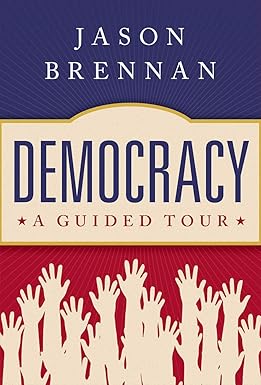Confession: I'm pretty sure I've never watched a Tucker Carlson show other than breezing by it with the TV remote. But I've posted quite a bit about other people commenting about Carlson over the years. Recently, it's been stuff like this, where I quoted numerous people eviscerating him, deservedly, for his rapturous take on Russia.
He's gotten worse, much worse over the years, according to his onetime friend, Jonah Goldberg, and his latest antics are reprehensible:
I’ve known Tucker for 30+ years. For most of that time, if I told him he’d become this guy one day, he’d have laughed, cursed me out, or punched me. This is just sad. It’s pathetic whether he’s doing it sincerely or as a grift. https://t.co/liy0NtW8Ct
— Jonah Goldberg (@JonahDispatch) September 4, 2024
That tweet's via Nick Catoggio's article at the Dispatch (probably paywalled): Free-for-All.
The occasion for their angst was Carlson’s lengthy chat with Darryl Cooper, whom Tucker described as possibly “the best and most honest popular historian in the United States.” Their topic was World War II. In hyping the interview, Carlson promised to shed light on aspects of the conflict that are supposedly “forbidden” to discuss.
Can you guess where this is going?
Cooper did in fact go there, calling Winston Churchill “the chief villain” of the war and implying that the Holocaust was an on-the-fly response to Germany being overwhelmed by a POW problem. As the interview circulated online, critics began examining his social media account and … that too was what you would expect, replete with musings about Hitler’s efforts to find, and I quote, “an acceptable solution to the Jewish problem.”
Also commenting is Power Line's Scott Johnson: The Tucker op; he includes a recent tweet from Cooper (@martyrmade), commented on by Abigail Shrier:
Tucker Carlson is a very bright man. He has the largest conservative podcast in the country, and eight weeks before a presidential election, he is approvingly boosting Nazi apologists.
— Abigail Shrier (@AbigailShrier) September 4, 2024
The Occam's Razor explanation?
He wants Kamala Harris to win. pic.twitter.com/MzIDHXTuKZ
Concludes Scott: "The damage Carlson is doing to the conservative movement has yet to be fully registered. There is more to come." And Jim Geraghty is wondering: Is Vance still going to hang out with Tucker Carlson, even now?.
On Sept. 21, JD Vance — U.S. senator and Republican vice-presidential nominee — is scheduled to appear with Tucker Carlson on the former cable host’s live tour at the Giant Center in Hershey, Pa.
Vance will be joining Carlson’s tour after Carlson got himself dismissed from Fox News, after Carlson’s fawning interview with Vladimir Putin, after his on-camera speculation that the U.S. government is in alliance with a malevolent spiritual force, and after this week’s program, during which guest Darryl Cooper, whom Carlson described as “the best and most honest popular historian in the United States,” declared that Winston Churchill “was the chief villain of the Second World War.”
Really? The chief villain? You can’t think of any other figure who might have earned that title?
Someone's gotta tell J.D. that proverb about lying down with dogs, getting up with fleas.
Also of note:
-
Also on the Russia sucker list. Jeff Maurer looks at the latest: Political Influencers Are Taking Russian Money, and I Can’t Believe I Haven’t Gotten in on That.
The Justice Department has charged two employees of a Russian state news agency with funneling nearly $10 million to several prominent right-wing YouTubers. The influencers who received money appear1 to be Dave Rubin, Tim Pool, Benny Johnson, and Lauren Southern — you may not know those names, but you probably would if you were a sexually frustrated 19 year-old who thinks that a second civil war would be the coolest thing to ever happen on this flat Earth. The DOJ also seized 32 internet domains that were part of a Russian propaganda effort called “Operation Doppelganger”, which sounds like a book that John le Carré must have written but somehow didn’t.
This revelation raises questions about who can be trusted in independent media. Which funding sources are okay? What obligation does a content creator have to disclose where their money is coming from? In the interest of leading by example, I’d like to assert that I Might Be Wrong receives no outside money: My work is funded entirely by subscriptions from readers like you. Which raises the question: How the fuck am I missing out on this gravy train? What the fuck, Russia? This blog is doing well, and I’ve made it beyond clear that I’ll debase myself for a modest fee — Russia…come on! You can’t even shoot me an e-mail and see what my integrity would cost?
He's joking, tovarish!
For the record, Maurer links to (credible) denials from Dave Rubin and Tim Pool that they had any idea about this funding.
And, who knows? It could be a lawfare operation from the Biden DOJ that will turn out to be another nothingburger.
(I've had some nice things to say, at least indirectly, about Dave Rubin in the past. But you know what they say about past performance.)
-
Speaking of past performance… Damien Fisher reports on some sad news for the University Near Here: Once A Bastion of Free Speech, UNH Falls in Latest Ranking.
For years, the University of New Hampshire had a reputation for fostering free speech and a diversity of ideas on campus. But that reputation has been under assault of late, and now its standing in the latest Foundation for Individual Rights and Expression (FIRE) annual rankings for campus speech has fallen from third in the nation to 59th.
“I did not expect such a drop,” State Rep. Daniel Popovici-Muller (R-Windham) told NHJournal. He was the prime sponsor of a new law protecting free speech on campus passed earlier this year.
You can peruse FIRE's 2025 College Free Speech Rankings for yourself. I can't find any explanation for UNH's precipitous drop, although it could well be more students reporting feeling a censorious atmosphere.
-
Nvidia is a wildly successful American corporation, so naturally… OK, I have to admit I didn't expect this, as reported by Ars Technica: DOJ subpoenas Nvidia in deepening AI antitrust probe, report says.
The Department of Justice is reportedly deepening its probe into Nvidia. Officials have moved on from merely questioning competitors to subpoenaing Nvidia and other tech companies for evidence that could substantiate allegations that Nvidia is abusing its "dominant position in AI computing," Bloomberg reported.
I assume the corporate officers failed to give enough money to the DNC? No, that doesn't seem to be true. Donations to Kamala outweigh those to Trump by nearly 8-to-1.
| Recently on the book blog: |


![[The Blogger and His Dog]](/ps/images/me_with_barney.jpg)



